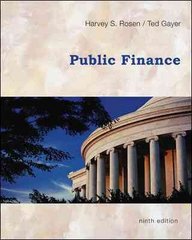Many controversial issues in public finance concern when a central authority should allow markets to work and
Question:
Many controversial issues in public finance concern when a central authority should allow markets to work and when it should intervene.
Generally we think of the government as the central authority, but it could be a university as well. For example, according to Princeton University’s student newspaper, the Daily Princetonian (April 16, 2007), there was “a flourishing market of graduation ticket buyers and sellers on [the Internet].” However, the dean of students shut down the market, arguing that
“[s]elling tickets undermines that spirit of community, and undermines the sense of class unity that seniors have worked hard to create.”
To analyze this policy, assume that a typical senior’s utility depends only on two commodities, graduation tickets and a composite of all other goods. Assume there are two students, Angelo and Bahn, each of whom starts out with three tickets. However, Angelo is “rich”
and has twice the amount of all other goods as Bahn. For simplicity, you may assume that graduation tickets are infinitely divisible.
a. Draw an Edgeworth Box showing the initial allocation, assuming conventionally shaped indifference curves for both students.
b. Using the Edgeworth Box, explain how the ban on selling tickets can lead to an inefficient outcome.
c. Using the Edgeworth Box, represent a situation in which the ban on selling tickets does not reduce efficiency for these two students.
Step by Step Answer:





